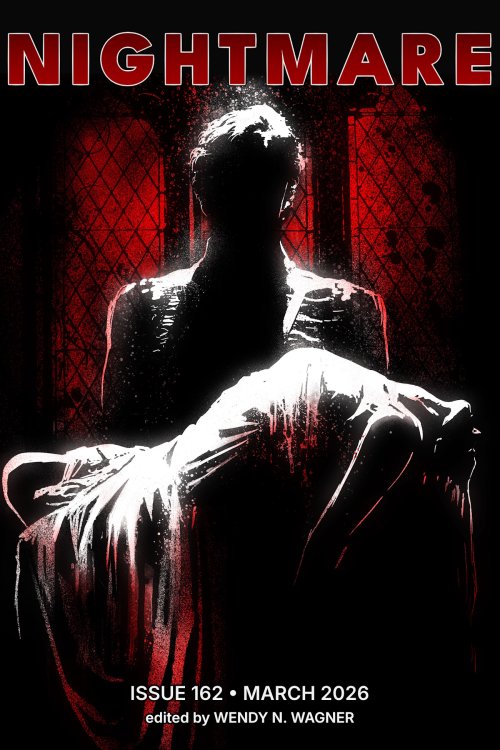Readers may already be familiar with the concept of epistolary stories, those told in the form of letters or diary entries, yet it’s not often we find stories written in response to, or as part of, a larger fictional work. “An Offering from the Void” is one of these rare stories and the voice and form were perfect for the narrative. Tell us something about what inspired this dark, lurid introduction to a fictional work.
Thank you! This story has two sources of inspiration. A while ago, I wrote a novella titled White Stone—not anything like the fictional text to which “An Offering from the Void” serves as introduction, but a separate story about the same stone and the intersecting (and, well, ruined) lives of those it comes into contact with. It’s experimental, disturbing, and deliberately disorienting. Perhaps this is why I have not yet been able to find a publisher for it. However, I found myself continuing to think about the stone and wanting to approach it from another angle.
The other source of inspiration is my favorite publishers—all the ones that bring little-known books to English readers, whether the books are in translation or forgotten/out-of-print; NYRB Classics, New Directions, McNally Editions, Wakefield Press, and Valancourt Books are some of my favorites and are responsible for a large portion of my reading. I wanted to write about a so-called lost writer but also to push that idea into somewhere strange by writing about a writer and book that may belong in oblivion. As my narrator says, “Some things, perhaps, are not and will never be classics, were rightfully neglected or lost for good reasons.” That’s the core concept I was working with. My interest in forgotten writers, the legend of the stone, and the narrative framework coalesced quite well. This story was a real pleasure to write.
When Harris finds the white stone and later meets with Alford, there is a sense that their determination to publish the book may cost them more than they expect. What do you think happened to them?
A sense of ambiguity and uncertainty is something I love when reading fiction as well as something I often evoke in my writing. Thus, I’ll say . . . I don’t know what happens to Harris. That said, there must be a cost to anyone who becomes so deeply involved in something as menacing as the stone and the book it inspired, right?
This story made me think of Lovecraft, Poe, Blackwood, Machen, and others, an intriguing mix of both cosmic and Gothic horror. Are you a fan of either subgenre? Do you have a favorite author or story?
I am a big fan of both cosmic and Gothic horror. As much as, or more than, the actual plots, what I love about these genres are the formal structures. I love found fiction and meta-narratives—anything weird and convoluted. I read a lot of strange stuff like this while writing my dissertation: not just one but two very obscure novels featuring devils (Ashtaroth and Lucifer, respectively) who hop between objects or people as they narrate their stories. And my favorite gothic novel is William Beckford’s Vathek (1782), first published in French and then translated into English with notes and purporting to be a translation of an Arabian tale. For anyone who hasn’t read it, I would describe it as an over-the-top, occasionally homoerotic blend of the Arabian Nights and Faust, with pseudohistorical footnotes and references to Middle Eastern culture, mythology, and history. I could go on . . .
As one might expect, I am drawn to writers who are off the beaten path. A fairly new (to me) discovery is Jean Ray, whose books Wakefield Press has been publishing. A really strange person who was ridiculously prolific and inspired by Lovecraft and Poe (he is sometimes called the “Belgian Poe”), he wrote unsettling and formally weird stories that I highly recommend. Also, Valancourt Books has published a lot of excellent horror—Gothic horror from its original period, the late eighteenth and early nineteenth centuries, as well as newer stuff. (There is a small allusion to their Women of Weird Tales in this story.) Finally, I have to mention the amazing Phyllis Paul, whose Twice Lost was published last year by McNally Editions. I read it months after writing this story, but it’s exactly the kind of thing my fictional editor would like. It’s slow-paced and very interior horror and a gothic novel in part about the mystery of other people, in which her characters traverse the dark recesses of their anxious, lonely minds. It’s not for everyone, but I found it completely revelatory.
Your short fiction and nonfiction has been published far and wide. Have you given any thought to writing longer works or perhaps dipping your toes into different literary forms?
Yes, I have written more than one long-form manuscript, including the aforementioned White Stone. Currently, I am trying to find homes for them. As for different forms, wouldn’t it be fun to write Ought Be Sequestered, complete with references?
What’s next for you? What can fans of Daniel David Froid look forward to in 2024?
I’m always working on short stories. I have a slow, sad science fiction story coming out in the zine King Ludd’s Rag later this year. And who knows: perhaps White Stone will someday find its way into the world and ruin more people’s lives.









